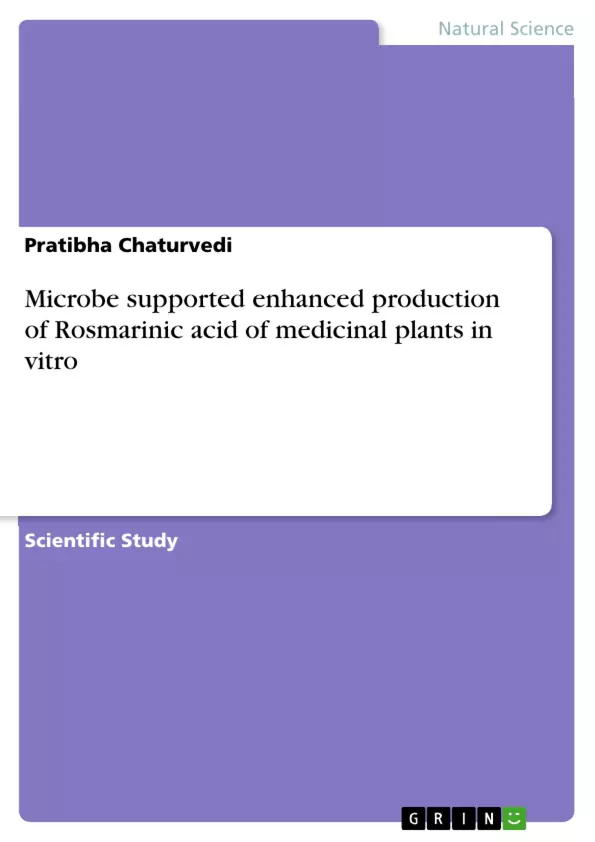In the described study , the bio-enhancement of Rosmarinic acid( RA) was done successfully in suspension culture of Salvia officinalis and Ocimum sanctum suspended with E coli K12 entrapped alginate beads.It is reported that Tyrosin Amino transferase has a key role in the production of Rosmarinic acid , which is present in E coli K 12. Quantification by HPTLC indicated that the maximum RA content was noted in 4 weeks old (2050 mg/l) in Salvia officinalis suspension culture fed with Tyrosin 10 mg/100ml followed by 4 weeks old Ocimum sanctum suspension culture fed with Tyrosin 10 mg/100ml(715 mg/l), that are about 18 fold and 5 folds enhancement as compared to control. The method for significantly enhancement of RA was reported for the first time.
Inhaltsverzeichnis (Table of Contents)
- Introduction
- Material and Methods
- Plant material
- Suspension media
- Preparation of beads of E coli K12
- Down stream process for Rosmarinic acid extraction
- High Performance Thin Layer Chromatography (HPTLC) Analysis
- Infra Red Spectral Studies
- Statistical analysis
- Results and Discussion
- Conclusion
- Acknowledgement
- References
Zielsetzung und Themenschwerpunkte (Objectives and Key Themes)
This study focuses on enhancing the production of Rosmarinic acid (RA) in plant suspension cultures using alginate beads entrapped with E coli K12. The goal is to investigate the potential of this bio-enhancement method for increasing RA yields, specifically in Salvia officinalis and Ocimum sanctum.
- Bio-enhancement of Rosmarinic acid production in plant suspension cultures
- Role of E coli K12 entrapped alginate beads in RA production
- Impact of various elicitors on RA production
- Quantitative analysis of RA using HPTLC
- Comparison of RA yields in Salvia officinalis and Ocimum sanctum
Zusammenfassung der Kapitel (Chapter Summaries)
The introduction presents Rosmarinic acid (RA) as a valuable phenolic compound with various medicinal properties. The study explores the potential of using E coli K12 entrapped alginate beads in suspension cultures of Salvia officinalis and Ocimum sanctum to enhance RA production. The "Materials and Methods" section outlines the procedures for preparing plant materials, suspension media, E coli K12 beads, and RA extraction. It also describes the analytical techniques employed for RA quantification, including HPTLC and FTIR spectroscopy. The "Results and Discussion" section presents the findings, including the impact of different elicitors on RA production and the comparison of yields in the two plant species.
Schlüsselwörter (Keywords)
The study revolves around Rosmarinic acid (RA), a valuable phenolic compound with diverse medicinal benefits. It investigates the use of E coli K12 entrapped alginate beads to enhance RA production in suspension cultures of Salvia officinalis and Ocimum sanctum. Key concepts include bio-enhancement, suspension culture, elicitors, HPTLC analysis, Tyrosine Amino Transferase (TAT), and the bio-production of secondary metabolites.
Frequently Asked Questions
How can Rosmarinic acid production be enhanced in plants?
This study demonstrates that using E. coli K12 entrapped in alginate beads within suspension cultures of Salvia officinalis and Ocimum sanctum significantly boosts Rosmarinic acid (RA) yields.
What is the role of E. coli K12 in this process?
E. coli K12 contains the enzyme Tyrosine Amino Transferase (TAT), which plays a key role in the biosynthetic pathway of Rosmarinic acid.
Which plant showed the highest increase in Rosmarinic acid?
Salvia officinalis showed an 18-fold enhancement (2050 mg/l) compared to the control when fed with Tyrosine, while Ocimum sanctum showed a 5-fold enhancement.
What analytical methods were used to quantify the results?
The study utilized High Performance Thin Layer Chromatography (HPTLC) for quantification and Infra Red Spectral Studies (FTIR) for analysis of the produced Rosmarinic acid.
Is this a new method for RA production?
Yes, the paper reports that this specific method for significantly enhancing Rosmarinic acid using microbe-supported beads is documented for the first time.
- Citar trabajo
- Dr. Pratibha Chaturvedi (Autor), 2017, Microbe supported enhanced production of Rosmarinic acid of medicinal plants in vitro, Múnich, GRIN Verlag, https://www.grin.com/document/355224



